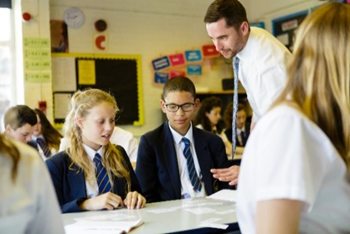2024-25 Specialist Knowledge for Teaching Mathematics (Secondary non-specialists)
Monday 7 October, Monday 11 November, Tuesday 10 December, Monday 3 February, Monday 17 March, Friday 23 May starting October 2024
Dates
Workshop 1 - Monday 7th October 2024 0930-1530 - Shrewsbury Town Football Club
Workshop 2 - Monday 11th November 2024 1300-1630 - Online
Workshop 3 - Tuesday 10th December 2024 0930-1530 - Hereford Group Training Centre
Workshop 4 - Monday 3rd February 2025 1300-1630 - Online
Workshop 5 - Monday 17th March 2025 1300-1630 - Online
Workshop 6 - Friday 23rd May 2025 0930-1530 - Shrewsbury Town Football Club
This project is designed to support non-specialist teachers teaching maths in a secondary school in developing specialist knowledge for teaching mathematics, thus enabling them to understand, teach and support students in maths in the classroom.
The programme will have the following elements:
- Online workshops
- The opportunity to put new learning into practice
- Lesson study (collaborative planning, teaching, watching planned lesson and reflection)
- Self study
The content of the programme includes
- Place value estimating and rounding
- Properties of number
- Ordering and comparing
- Simplifying and manipulating expressions, equations and formulas
- Arithmetic procedures
- Solving linear equations
- Multiplicative reasonings
- Trigonometry
- Sequences
- Graphical representations
- Statistical representation and measures
- Statistical analysis
- Stats - probability
- Geometrical properties
- Perimeter, area and volume
- Transforming shapes
- Constructions
Mathematics is a creative and highly interconnected discipline that has been developed over centuries, providing the solution to some of history’s most intriguing problems. It is essential to everyday life, critical to science, technology and engineering, and necessary for financial literacy and most forms of employment. A high-quality mathematics education therefore provides a foundation for understanding the world, the ability to reason mathematically, an appreciation of the beauty and power of mathematics, and a sense of enjoyment and curiosity about the subject (National Curriculum).

Maths Hubs are well placed to provide training for non-specialist teachers of maths so that these teachers have the opportunity to increase their knowledge and understanding of the intentions of the maths national curriculum and develop their pedagogical skills. This programme is aligned with an overall Teaching for Mastery Programme designed to develop maths teaching in secondary schools.
Who will be leading the group?
Christine Watson
Who is it for?
This programme is provided for non-specialist teachers of maths in state-funded schools who fit the following definition: ‘A non-specialist teacher of mathematics is ‘a teacher that is currently teaching some mathematics or has commitment from a headteacher/executive head to teach some mathematics within the next year, who has not undertaken initial teacher training (ITT) in mathematics’. This could include:
- non-specialist QTS teachers with an active commitment from their school to teach maths within the next academic year
- non-specialist non-QTS teachers with an active commitment from their school to teach maths within the next academic year
- overseas-trained maths teachers (from EEA or the big 4) with:
- QTS status obtained through the mutual recognition route
- residency in the UK and eligible to work in England
- an approved teaching post in a secondary school or college with commitment from their new school to complete SKTM.
If there is sufficient space in the cohort, other teachers of maths who do not fit this definition but would benefit from this support may also participate. The programme will be run over the equivalent of 6 days where there will be 18 core sessions. In addition to attendance at these sessions, participants will be asked to carry out follow-up tasks back in their schools to enable practice transfer to the classroom. It is recommended that each participant has a named mentor back in school who can follow up with a professional learning conversation after each session.
What are the intended outcomes?
Student outcomes
Students will:
- develop a deep, secure and connected understanding of the maths they are learning
- achieve both conceptual understanding and procedural fluency
- think, reason and discuss their maths in order to deepen their understanding • have a positive attitude to maths.
Practice development
Participants will:
- explore and increase their use of a range of pedagogic approaches consistent with teaching for mastery
- increase their confidence in planning for progression in maths.
Professional learning
Participants will:
- improve their subject and curriculum knowledge of secondary maths with a particular emphasis on mathematical structures in key areas
What is the cost?
Funded by DfE so participation is free for schools
Book
